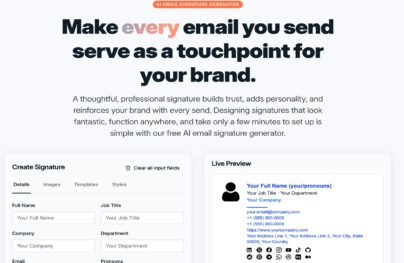Email Sender Reputation – What You Need to Know
Email reputation or email sending reputation isn’t widely talked about, but it’s vitally important. Much like in real life, where your reputation is everything, in email marketing, it is a tiebreaker that decides whether subscribers get an email newsletter from you or not.
A strong email reputation underlies every email marketing victory. While it may seem that the only things that matter are CTR and ROI since they indicate traffic, leads, and revenue, that’s not always the case. Every success story begins with building a healthy and strong email reputation that one day will pay you off with good rates. Let us get to the bones of this powerful metric and find out how to check and improve it.
What is Email Reputation?
Email reputation is a score given to you by Internet Service Provider. It indicates whether you follow standards, meet current demands established by ISP, and play fairly. If it is high, chances are your email newsletter will land in inboxes; if it is low, then be ready to face SPAM filters.
In addition, it is not just one thing to monitor. It combines IP reputation, domain reputation, and content reputation to create an overall picture.
Email Deliverability Checker Tutorial
IP Reputation
IP reputation was the first metric introduced by ISP. It was and still is a base for defining the email reputation of a sender. It helps to detect suspicious behavior by monitoring spam and viruses.
With Postcards Email Builder you can create and edit email templates online without any coding skills! Includes more than 100 components to help you create custom emails templates faster than ever before.
Free Email BuilderFree Email TemplatesThe main problem of IP reputation lies in the fact that the majority of entrepreneurs, especially ones that only start their businesses, are most likely to use shared IPs. While it is a perfect bargain for beginners, it can become a real disaster for an overall marketing campaign.
The deal is that with shared IP, your IP reputation depends on people who use the same IP. If someone disobeys rules, it will affect you as well. Therefore, if you cannot afford dedicated IP or volume of your subscription list does not require one, it is highly recommended to monitor your IP reputation closely and use only established ESPs.
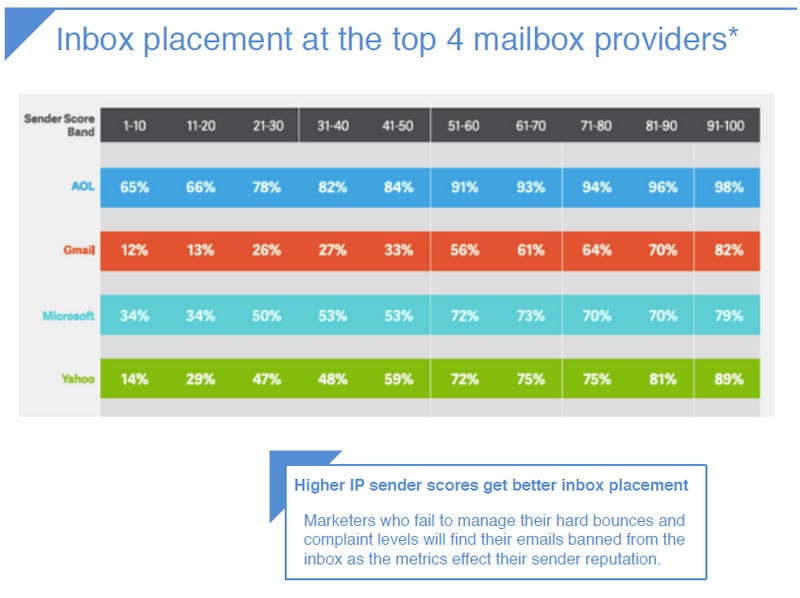
Email Reputation Deliverability Metrics
Domain Reputation
Alone, IP reputation is not enough to determine the quality of a sender. As a rule, an email reputation score is obtained from an in-depth systematic analysis of domain reputation that allows making the decision more accurate.
ISP keeps track of how your domain was used and decides whether it is trustworthy. It is a complex metric, as well. In fact, it comprises many reputation scores inside, and only the ISP decides what to consider and how to range your domain reputation.
The good thing about domain reputation is that it allows you to change IP and still get a good sending score since it weighs a lot. One downside, if it is unhealthy, then be ready to face drastic consequences that will follow you from IP to IP.
Content Reputation
Content reputation measures the copy of the email newsletter and figures out whether information sent to the contacts is valuable, non-spammy, and non-offensive. Using a set of criteria, it determines the quality of the content.
For instance, if the copy includes a virus, or the sender asks about account details, the ISP marks it as spam without question asked. What’s more, if open and click-through-rates are getting low, there’s also a decrease in content reputation. Content reputation is another aggregate metric whose score is obtained from various aspects.
With Startup App and Slides App you can build unlimited websites using the online website editor which includes ready-made designed and coded elements, templates and themes.
Try Startup App Try Slides AppOther ProductsNote that your design should perfectly envelop it in order to bring the best user experience, whatever device or email reader is used. If you do not have coding or design skills, use Postcards, a free HTML email newsletter builder. With its intuitive interface and hundreds of handcrafted blocks, you will quickly create a good-looking and valid email newsletter that will increase content reputation and give you extra time to sort out other issues.
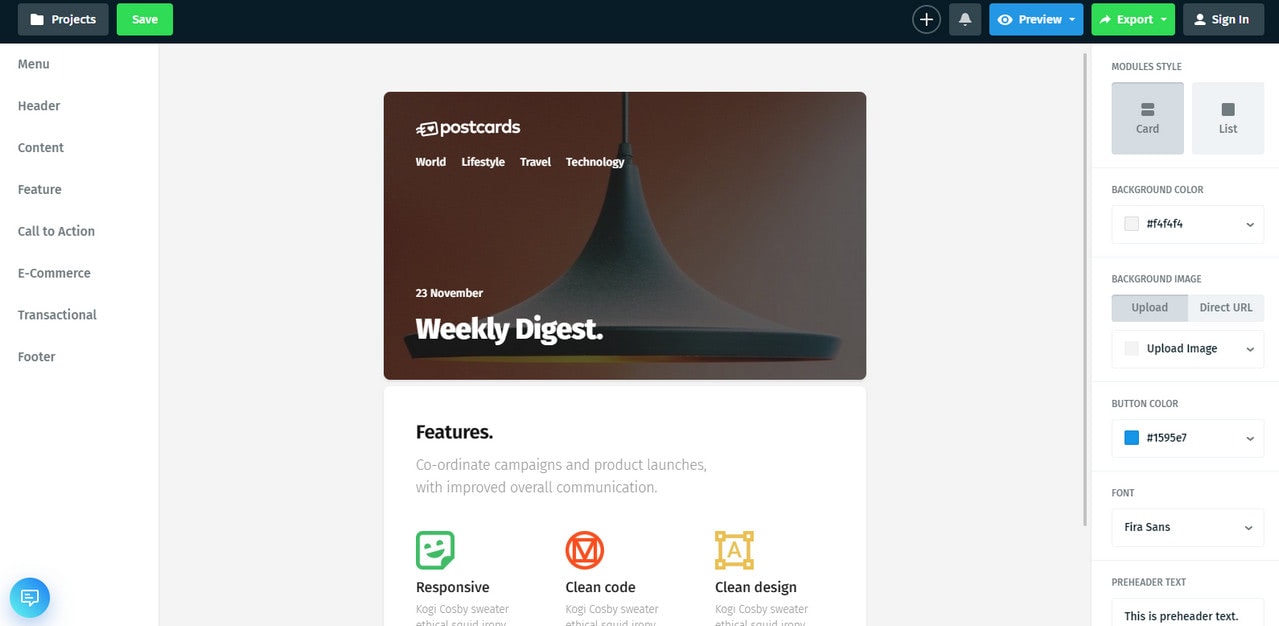
What Ruins Email Reputation?
Earning a good email reputation can be hard, whereas ruining it can be easy. To make matters worse, if you do not monitor the situation, you may even not know that something is wrong until you get bad a CTR and low ROI.
The main metric to pay attention to in order to prevent drastic outcomes beforehand is email deliverability rate. The first signs that something is wrong with your email reputation are:
- High soft bounce rate
- High SPAM complaints rate
- Low deliverability rate
On top of that, if your email is often blocked, flagged, and rejected, it also indicates a bad email reputation.
So what exactly can ruin your reputation? The main reasons are:
- Use of untrusted ESP
- Use of untrusted shared IP
- Use of free addresses
- A high number of spam trap hits
- Sending a newsletter to unknown email addresses
- Sending to catch-all email addresses
- Being caught in a spam trap
- Being caught in blacklist
- Use of spammy subject lines
- Use of misleading subject lines
- Use of spammy content
- Use of abuse content
- Use of spam trigger words in the content
- Use content that fishing personal information, bank account details, and other things that conflict with the privacy policy
- Emailing too often
- Growing subscription list quickly
- Purchasing email addresses
- Low engagement
- Low open rate
- Low CTR
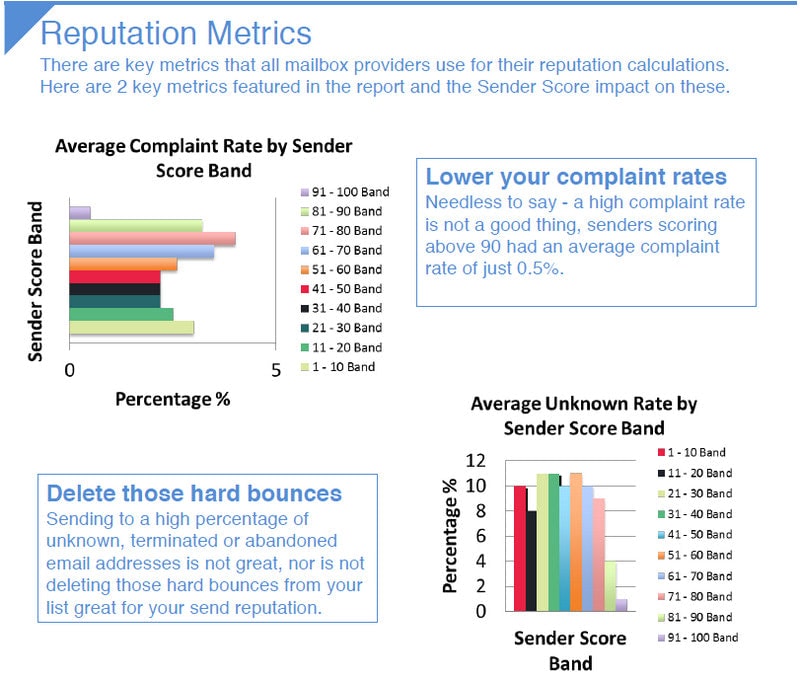
Email Reputation Deliverability Metrics
How to Repair a Bad Email Reputation
The first thing to do when you repair something is to figure out the reason why it happened in first place, and email reputation is no exception. Therefore, start by analyzing all the metrics and campaign reports to delineate possible issues. Your task is to find patterns and irregularities.
Second, analyze complaints. If there is something you can do – react.
Third, clean your subscription list since sending emails to unengaged contacts will ruin your email reputation even more. Remove all inactive and invalid addresses as well as those who complain that your newsletters are spam.
Fourth, run your IP through blacklist lookup regularly. It will help to identify whether you are blacklisted or not.
Finally, if you use shared IP, chances are you have a “bad neighborhood.” Switch your provider to a long-established and trusted email marketing automation platform like Mailchimp. It can guarantee high-quality IPs.
How to Maintain a Good Email Reputation
Email reputation is directly linked to the deliverability rate. These metrics indicate whether you pass barriers and get through filters or end up in the SPAM folder. To maintain a good email reputation, you should follow the best practices of maintaining a good deliverability rate. Embrace the technical side and protect yourself with an email authentication system.
The email authentication system is based on three main pillars: SPF, DKIM, and TLS.
SPF
Sender Policy Framework (SPF) is a protocol that helps others understand that the email newsletter comes from you and not a spammer. It prevents hackers from tricking the ISP by faking domain names.
Briefly, it analyzes the “Return-Path” value to check the original server and verify the IP address. Using SPF, you tell ISP that only these IP addresses or server can send an email on your behalf, excluding situations of fabrication.
Therefore, the first step to do in order to secure your good email reputation is to tune SPF.
DKIM
Domain Keys Identified Mail (DKIM) lets you associate a domain name with your email using a digital signature. When you sign your email, the system creates a unique string of characters that helps uniquely recognize you. An MTA, or mail transfer agent, verifies this “hash value.” If everything is fine and the message has not been altered, then it can pass filters.
The good thing about setting DKIM is that it increases trust in you, which in turn improves your email reputation.
Note, SPF and DKIM should be used in tandem since only then they can guarantee a high level of security. Do not be afraid of these intricate terms; if you are using email automation platforms, they do all the heavy lifting for you. You just have to tweak the necessary settings.
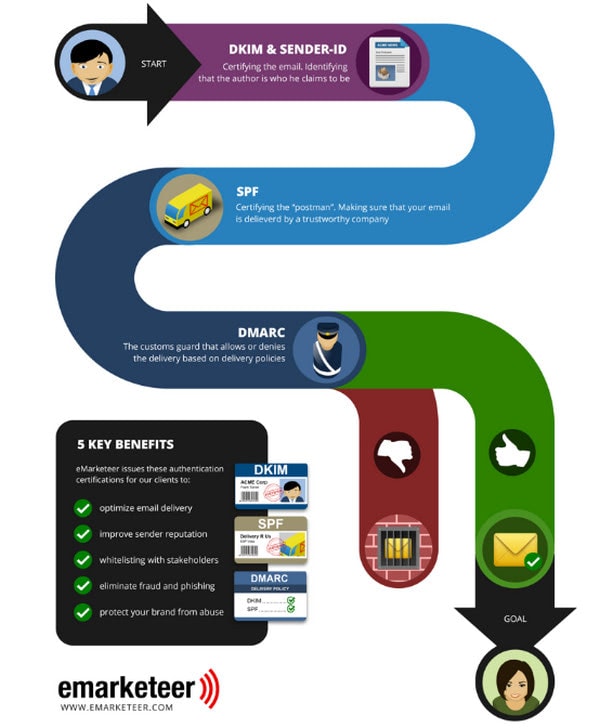
Reach an Inbox Infographic
TLS
Transport Layer Security (TLS) is a security protocol that also contributes to authenticity. It encrypts communication, thereby protecting your email newsletter from intrusion. Encryption, authentication, and integrity are the three main elements of TLS. Therefore, it certainly vouches for authenticity, raising your credit, and giving you extra points in the face of ISP.
While these three aspects are great for maintaining and even improving your email reputation score, there are some other helpful tips to assist the matter. So what can you do more?
- Clean subscription list to send emails to only engaged contacts
- Collect only addresses of engaged contacts
- Do not purchase contacts
- Run re-engagement campaigns
- Quickly react to complaints
- Test your email validity
- Switch to dedicated IP
- Warm-up your IP
- Create only responsive designs that provide a consistent user experience
- Follow the best practices of email marketing
- Double-check your email before sending
- Choose meaningful subject lines
- Avoid spammy phrases and words such as “Free!!!”
- Check your email reputation regularly
Tools to Check Your Email Reputation

Checking your email reputation regularly is highly recommended. To do this, address the issue using one of these tools.
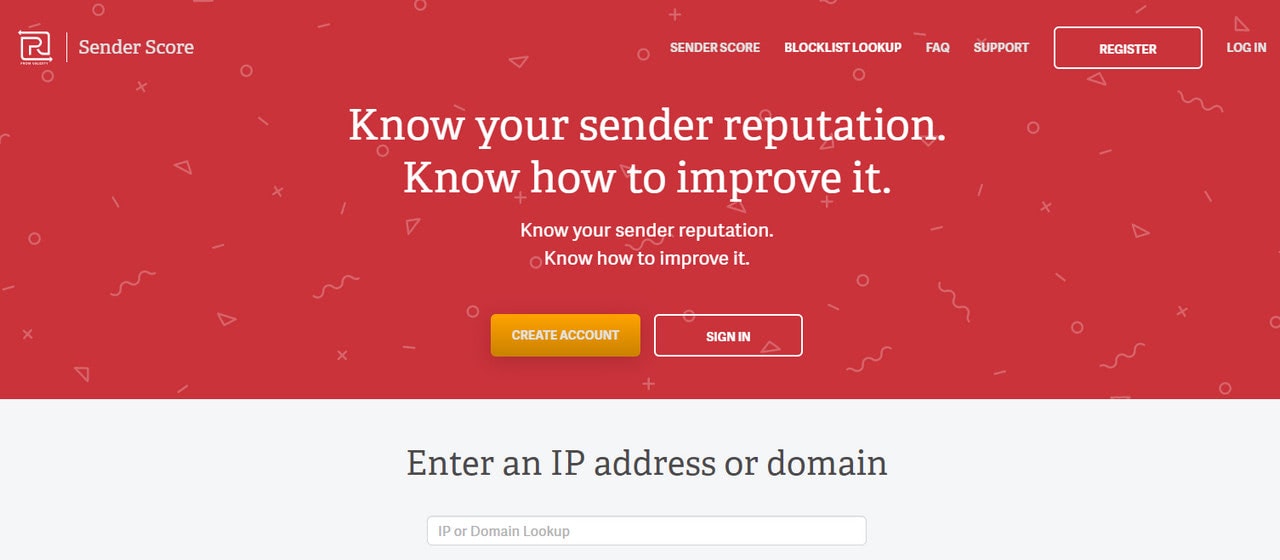
The first tool in our list is a big name in this industry. It is one of the most popular online instruments for measuring your sending score and getting insights on your email reputation. Coming with Return Path’s deliverability solution, not only does it show your score, but it also generates tips to improve it. The platform also has a Blocklist Lookup that you can use to find out whether your IP is listed on popular blacklists or not. What’s more, here you can find data that influence a decision-making process.

Reputation Authority
Born in the mid-’90s, Reputation Authority is one of the oldest online tools to check your Domain and IP reputation. While it measures score using some popular factors, it also provides current information on top offending IP addresses and top virus threats.
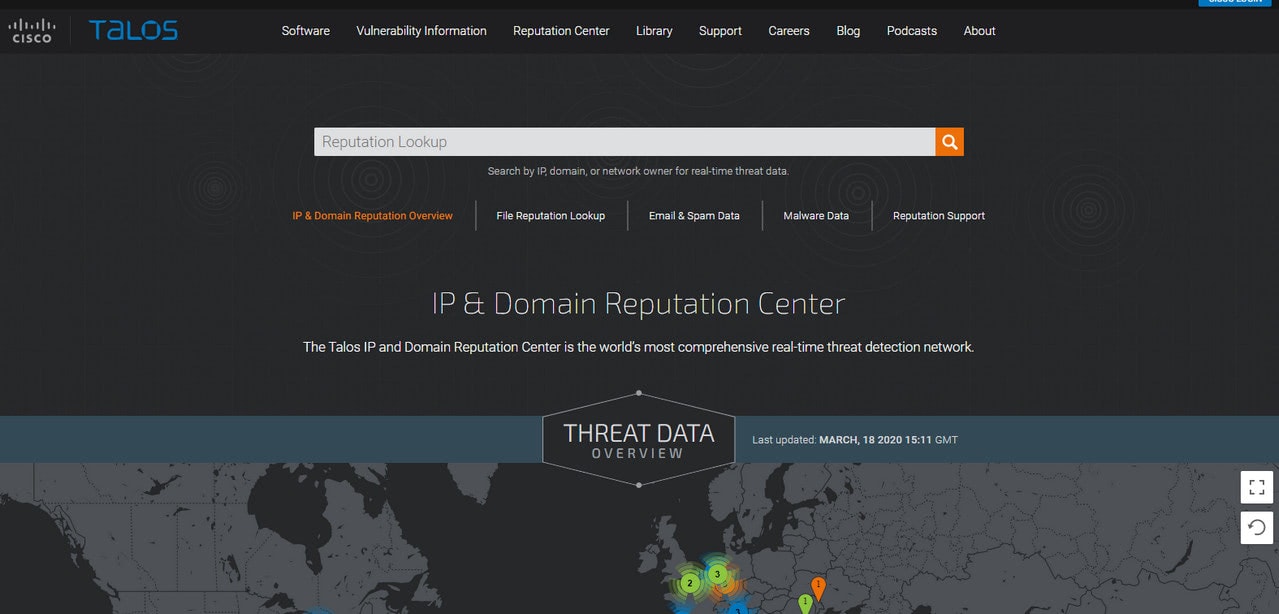
Much like Sender Score, Talos Intelligence is another big name. This sterling threat-detection system works in real-time. It focuses on defining IP and domain reputation. All you need to do is to enter your IP. It will analyze a whole range of criteria showing what amount of threat activity has been observed from the chosen address.
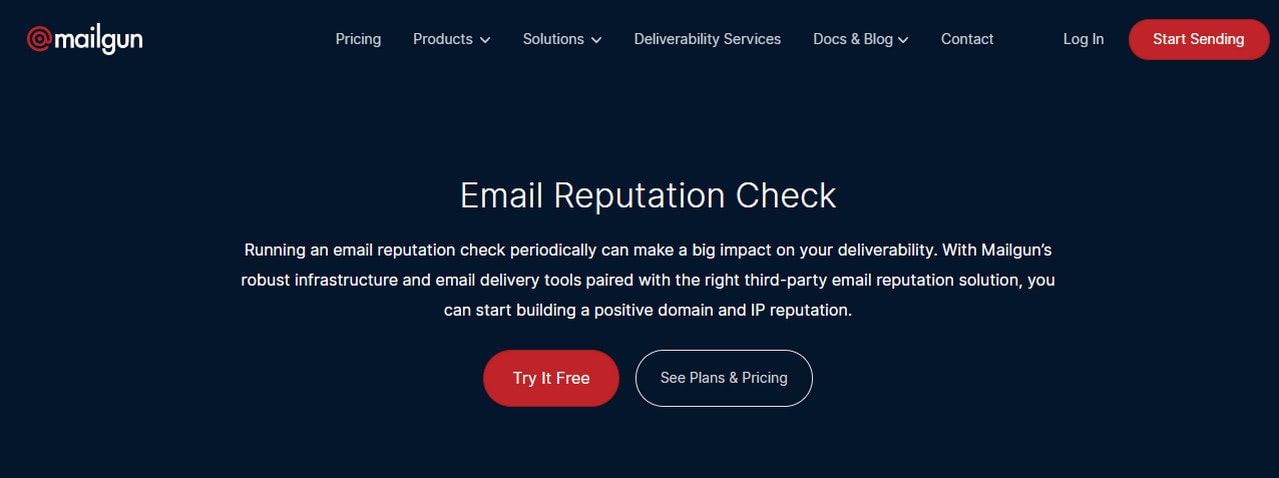
Email Reputation Check is a part of the plans available on the Mailgun platform. This one also tests your IP and domain. It searches through various popular databases as well as analyzes a dozen factors concerning your deliverability to bring about an accurate result.
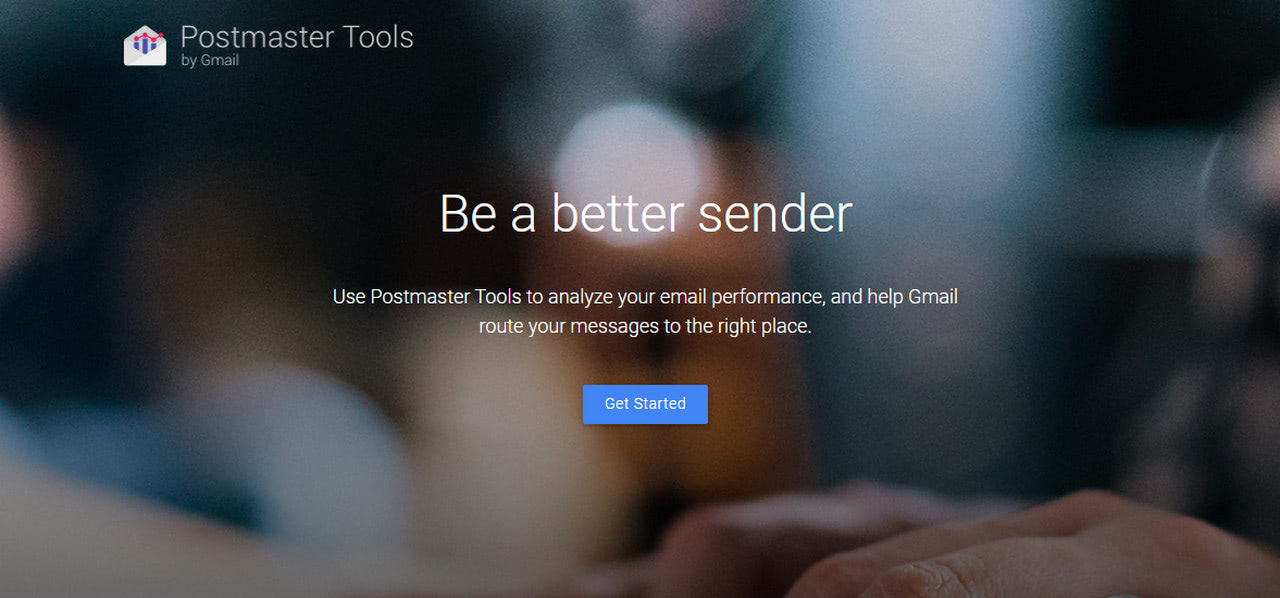
Google Postmaster Tools
Postmaster Tools by Google is a unique service that gives you access to information such as delivery errors, spam reports, feedback loops, and others. It will provide you with insights on your email performance. Here, you can diagnose your campaign and try to find ways to improve your email reputation and deliverability rate.
Conclusion
Remember, earning a good reputation may take lots of time, but destroying it may take just several poor decisions, or in the case of using shared IP, poor decisions of your “neighbors.” It is here where you need to exercise caution, always monitor the situation, be ready to fix problems on time, and simply play fair and square.



